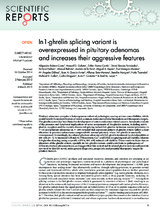In1-ghrelin splicing variant is overexpressed in pituitary adenomas and increases their aggressive features

Ver/
Autor
Ibáñez-Costa, Alejandro
Gahete Ortiz, Manuel D.
Rivero-Cortés, Esther
Rincón-Fernández, David
Nelson, Richard
Beltrán, Manuel
Riva, Andrés de la
Japón, Miguel A.
Venegas-Moreno, Eva
García-Arnés, Juan A.
Soto-Moreno, Alfonso
Morgan, Jennifer
Tsomaia, Natia
Culler, Michael D.
Diéguez, Carlos
Castaño, Justo P.
Luque, Raúl M.
Gálvez-Moreno, M. Ángeles
Editor
Nature.comFecha
2015Materia
Cell biologyPituitary tumors
METS:
Mostrar el registro METSPREMIS:
Mostrar el registro PREMISMetadatos
Mostrar el registro completo del ítemResumen
Pituitary adenomas comprise a heterogeneous subset of pathologies causing serious comorbidities, which
would benefit from identification of novel, common molecular/cellular biomarkers and therapeutic targets.
The ghrelin system has been linked to development of certain endocrine-related cancers. Systematic analysis
of the presence and functional implications of some components of the ghrelin system, including native
ghrelin, receptors and the recently discovered splicing variant In1-ghrelin, in human normal pituitaries (n
5 11) and pituitary adenomas (n 5 169) revealed that expression pattern of ghrelin system suffers a clear
alteration in pituitary adenomasas comparedwith normal pituitary, where In1-ghrelin is markedly
overexpressed. Interestingly, in cultured pituitary adenoma cells In1-ghrelin treatment (acylated peptides at
100 nM; 24–72 h) increasedGHandACTHsecretion, Ca21 and ERK1/2 signaling and cell viability, whereas
In1-ghrelin silencing (using a specific siRNA; 100 nM) reduced cell viability. These results indicate that an
alteration of the ghrelin system, specially its In1-ghrelin variant, could contribute to pathogenesis of
different pituitary adenomas types, and suggest that this variant and its related ghrelin system could provide
new tools to identify novel, more general diagnostic, prognostic and potential therapeutic targets in
pituitary tumors.
